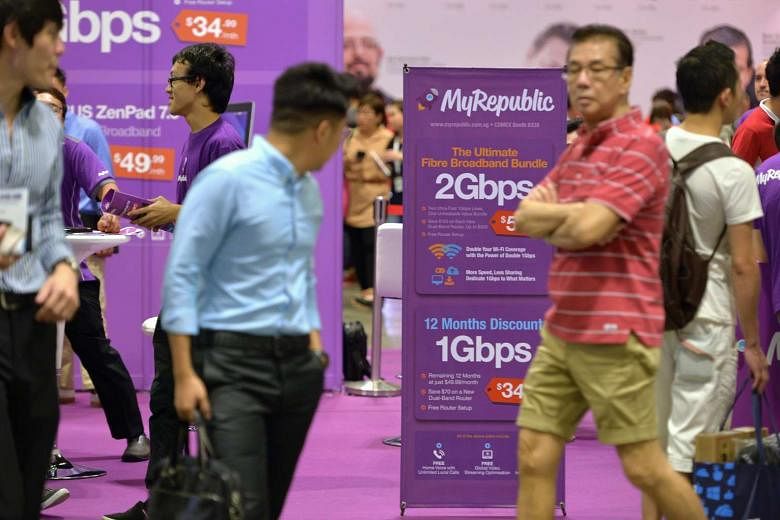Two companies that are eyeing the chance to become the fourth telco here have criticised the three existing telcos for raising objections to a proposal to set aside premium frequency bands for a new player.
OMGTel and MyRepublic have hit out against Singtel, StarHub and M1, with one of them accusing the three telcos of being "disingenuous" and "self-serving".
They were responding to calls by the three existing players for the authorities to reduce the amount of premium spectrum which might be reserved for the potential fourth telco in an auction early next year.
The Infocomm Development Authority (IDA) had called for feedback in July on a proposal to reserve one-third of all the usable frequencies in the 900MHz range for a possible new player at a heavily discounted price.
This is a premium range as it allows for better signal propagation, especially through concrete, with less mobile equipment.
The three telcos - whose 900MHz spectrum rights expire in March 2017 - said their customers' 3G mobile connections would suffer if they do not retain their current holdings, The Straits Times first reported on Sept 8.
In a forum letter published today, OMGTel director Sallim Abdul Kadir said: "It is disingenuous, if not self-serving, for the three telcos to say that the networks which they have designed and rolled out over the years now cannot meet consumer expectations without further extension of the 900MHz spectrum."
He noted that the three telcos got huge blocks of another spectrum for 3G in 2001, and were expected to provide nationwide coverage using that. And the rights to that spectrum do not expire until 2021.
"If the 900MHz spectrum is reallocated to the telcos for their 3G services, it would be effectively rewarding them for a lack of planning," he said.
MyRepublic chief executive Malcolm Rodrigues also criticised the three telcos in an e-mail to The Straits Times. They "waste spectrum" on old technologies and are trying to "minimise spectrum availability to new players", he said.
The entry of a fourth telco will ensure that the scarce premium spectrum will be used efficiently for the latest 4G networks, he said.
"There is grossly insufficient mobile data capacity to meet the rising demand for mobile data."
In response, an M1 spokesman said it uses the 900MHz spectrum to deliver better indoor coverage, especially in dense housing estates. This is to meet IDA service standards, which have been steadily tightened since the telco launched 3G services in 2005.
Since April 2013, IDA has required telco networks to cover at least 99 per cent of outdoor areas, and 85 per cent of all floors in buildings. An operator which fails to meet the various standards may be fined up to $50,000 every month for each breach.
A StarHub spokesman noted that existing telcos need to have sufficient 900MHz frequencies to serve existing customers and meet IDA's stringent standards.
"As we build new and better networks to meet the ever-growing demand for ultra-fast speeds and data-hungry applications, we are mindful that there are customers who are still connected on the older networks," she added.
Singtel declined to comment. IDA has yet to decide on its proposal.


